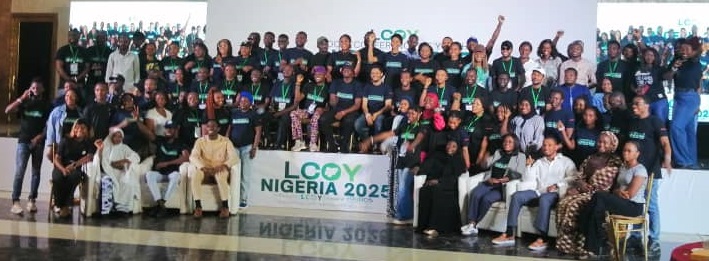By: Goodluck E. Adubazi, Abuja.
A powerful wave of youth leadership in climate governance swept through the nation’s capital this week as hundreds of young climate advocates, civil society leaders, and government officials converged for the Local Conference of Youth (LCOY) Nigeria 2025, held from November 5–6 in Abuja.
The two-day conference, themed “Youth at the Forefront of Climate Justice: Accelerating Action for a Just, Sustainable Future,” ended with a strong communiqué calling for the full inclusion of young people in shaping Nigeria’s climate policies and sustainable development agenda.
The Country Director of ActionAid Nigeria, in her opening address, emphasised that “meaningful climate action in Nigeria must recognise youth not just as beneficiaries but as key innovators and implementers.”
In their welcome remarks, youth leaders Patrick Amaibi and Yahuza Ismail reaffirmed that youth-led networks are already driving local climate solutions across the country — from renewable energy innovations to community-based adaptation projects.
Officials from the National Council on Climate Change (NCCC), the Federal Ministry of Environment, and the Federal Ministry of Youth Development expressed readiness to strengthen partnerships with youth groups, pledging to create more inclusive channels for policy dialogue and implementation.
Throughout the sessions, participants highlighted the urgent need to bridge the widening gap between youth activism and policymaking. They called for transparency, accountability, and accessible decision-making mechanisms to ensure that young people have real influence in Nigeria’s climate response.
Delegates also engaged in thematic working groups focused on key issues such as:
Climate Finance and Resource Mobilisation
Renewable Energy and Energy Transition
Biodiversity and Ecosystem Restoration
Youth, Gender, and Inclusive Climate Action
Sustainable Agriculture and Food Security
Technology and Innovation for Emission Reduction
These deliberations culminated in the refinement of the National Youth Statement (NYS) — a landmark policy framework articulating youth priorities and commitments toward climate justice and national resilience.
The communiqué emphasised that Nigeria faces escalating climate impacts — from flooding and desertification to food insecurity and energy crises — which disproportionately affect young people, who make up over 60% of the population. Despite this, youth representation in policy formulation and implementation remains limited.
The LCOY platform, according to organisers, seeks to close this gap by fostering structured youth engagement and harmonising policy priorities ahead of global climate summits such as COY and COP.
As Nigeria prepares for deeper international engagement on climate change, participants urged the government, private sector, development partners, and sub-national actors to invest in youth-led climate adaptation projects, green entrepreneurship, and inclusive transition pathways.
“Sustained climate progress in Nigeria requires sustained youth leadership — supported, resourced, and recognised,” the communiqué declared.
The conference concluded with delegates reaffirming their collective commitment to climate justice and expressing gratitude to partners and supporters for their continued collaboration.

